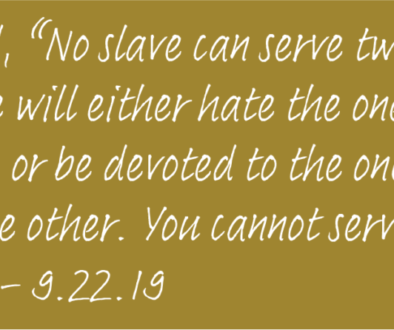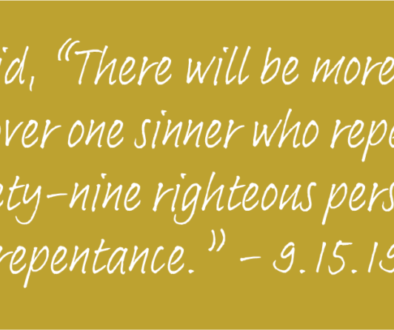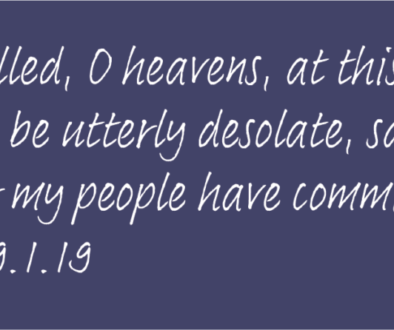September 8, 2019
The Thirteeenth Sunday after Pentecost E. Bevan Stanley
September 8, 2019
Proper 18, Year C, Track 1
Jeremiah 18:1-11
Philemon 1-21
Luke 14:25-33
From the Gospel: Whoever comet to me and does not hate father and mother, wife and children, brothers and sisters, yes, and even life itself, cannot be my disciple. In the Name of the Father and of the Son and of the Holy Spirit. Amen.
This has got to me one of the most difficult sayings of Jesus for us to accept. It is so harsh that we immediately put up our defenses. Jesus commands us to love, not to hate. Our families are where we learn about love. Surely this is a mistake. Maybe we can just ignore it. What are we to make of it? Let me say up front that I cannot explain it to you in a totally satisfactory way. Instead, let’s make some observations about the text and see if we can get some insight into what is going on.
First let’s look more closely at the entire passage we just heard and its context. I am sorry if this may seem more like a lecture than sermon, but I can’t think of a better way to unpack this difficult passage. This a case when scholarship is actually helpful.
For a few chapters here in Luke we get a whole series of stories, parable, and sayings of Jesus as he travels towards Jerusalem. The piece we heard this morning starts a new section. But there are really four different parts. There is the part about hating family members to be a disciple. Then he says we have to take up the cross and follow him to be his disciple. There follows two parables about counting the cost of an enterprise before starting it—one about building a tower, the other about going into battle. Then he returns to the cost of discipleship, but now he is not talking about hating family members, but about giving up all one’s possessions. This whole piece is in Matthew as well as Luke but not in Mark. Only the line about taking up our cross is in Mark. It has long been noted that the first three Gospel—Mathew, Mark, and Luke are very similar to each other, and very different from the Gospel of John. Because of this similarity, they are called the Synoptic Gospels. To explain why there is some material that is shared by Matthew and Luke but not in Mark, scholars have hypothesized that there may have been a document that has been lost that was a source for Matthew and Luke, but which Mark did not use. This material is mostly sayings, with no narrative connecting them. Sort of like a dictionary of sayings or Bartletts Quotations. Some of the sayings may have been organize similarity of idea or even just of words.
Perhaps that’s what we are looking at here. Fours sayings of Jesus that he may have said at different times in different contexts. They were remembered and written down. Then Matthew and Luke take these free floating sayings and put them into the narrative frameworks of there accounts of Jesus’ ministry. Three of these sayings are connected by the idea of the cost of being a disciple. The other two are there because of the idea of estimating the cost before starting. If this is how these sayings came to be clustered together here in Luke, then we have no idea what situation caused Jesus to say these things in the first place. In what conversation, would Jesus be provoked to say that disciples should hate their families?
Another aspect of scholarship is that there has been much work done in recent decades an analyzing the rhetorical forms and devices of the languages in use at the time of Jesus. It is common in the semitic languages to use extremely sharp contrasts to make a point. Dark and light. Holy and an abomination. Love and hate. It would be typical of the Aramaic that Jesus spoke to use this sort of strong statement to emphasize a point that we English speakers would express far more moderately.
Having acknowledged all this, we are still beset with these very difficult sayings about hating members of our families, taking up the cross and giving up our possessions. The first and third can be dealt with by the idea of detachment. We should not let our affections, desires, or comforts get in the way of our relationship with Jesus. Jesus illustrates this in another place when he is speaking in a house and is told that his mother and brothers are outside. He replies, “Who are my mother and brothers? Those who do the will of God are my mother and brothers and sisters.” The urgency to pursue the Kingdom of God relativizes all other agendas. The requirement to take up the cross is clearly urging us to imitate Jesus even in his most difficult and painful challenges.
Very briefly the other two readings also flavor this scriptural stew. Jeremiah speaks of the need for Israel to changer there ways. In using the metaphor of the potter, though, he says that we are in God’s hands. God can destroy us or make us, and more hopefully, God can re-make or re-shape us.
In Philemon we see a very tender side of Paul, who is concerned about a slave named Onesimus. He is sending him back to his owner, Philemon, urging Philemon to free Onesimus and change the relationship from owner and slave to brothers in Christ.
So taken all together what do we have? Paul envisions a new kind of community that he often calls the Church or the Body of Christ. This new community is the beginning of the Kingdom of God on earth. In this community there is equality and love. This is the same Kingdom that Jesus proclaimed as breaking into human history now. This is the same community of justice and mercy that Jeremiah was urging the Israelites of his own time to inhabit.
Since the word as it is is not the world as it should be, establishing this community that is the beginning of the kingdom of God is hard and risky. It may involve breaking down the structures of the kingdoms of earth, other ways of structuring society that are hindrances to establishing the Kingdom of God. Clearly Herod, the religious hierarchy and the Roman government all felt threatened by Jesus proclamation of this new order of justice and compassion. Those of us who want to continue the millennia long work of making the Kingdom of God a reality on earth should expect resistance, misunderstanding, defensiveness and even retaliation.
To my mind Jesus is saying, “This is going to be tough. If you want to join me in this divine work of rebuilding the world understand that it will be risky and costly. And only you can decide if it is worth it. It reminds me of the Antarctic explorer Ernest Shackleton, who recruited his team of sailors and explorers with this want ad in the news papers:
MEN WANTED for Hazardous Journey. Small wages, bitter cold, long months of complete darkness, constant danger, safe return, doubtful. Honor and recognition in case of success – Ernest Shackleton.
He received 400 applications for 27 spaces.
Jesus invites to join him in the greatest work, the greatest adventure of all time. It won’t be easy, but can you think of better cause on which to spend your life? What do you say?



